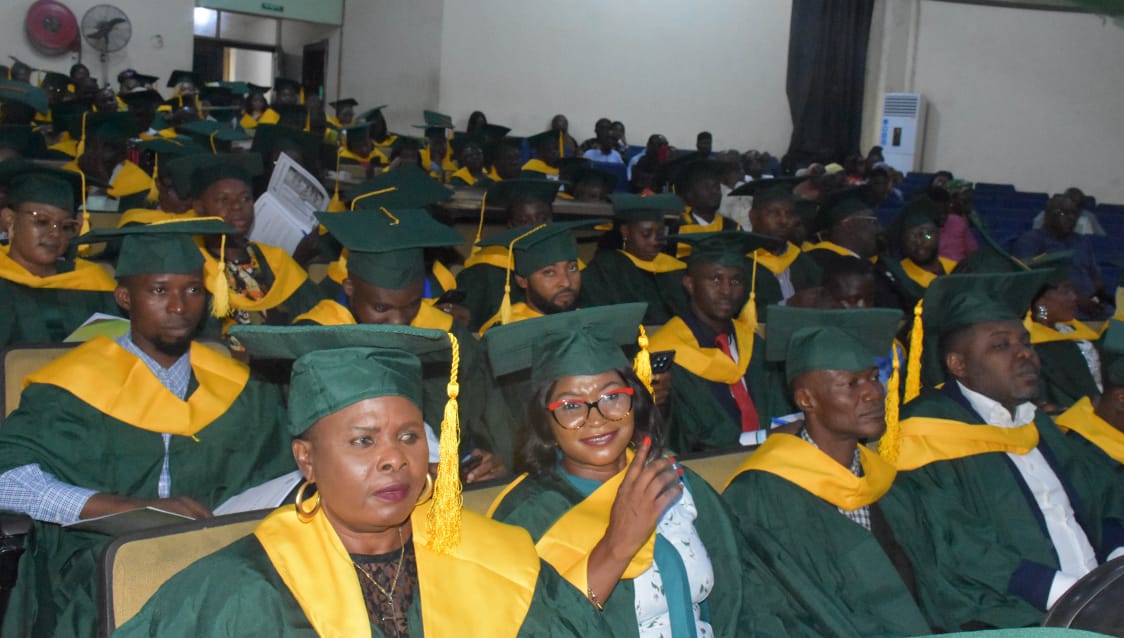News
Procurement Institute Pushes for Professional Recognition as 255 New Members Join

By Joel Ajayi
The Chartered Institute of Purchasing and Supply Management of Nigeria (CIPSMN) has reiterated its call for proper recognition of procurement and supply chain management as a critical driver of national development.
The Registrar and Chief Executive Officer of the institute, Prof. Mohammed Aliyu, made the appeal in Abuja during the 2025 Group B Induction Ceremony, where 250 graduate members and five fellows were formally admitted into the profession.
Aliyu described procurement as too strategic to be left in the hands of unqualified individuals, stressing that it requires professional certification and ethical grounding, just like medicine, law, or accounting.
“When we are talking about procurement, we are talking about value for taxpayers’ money. It is not a function for just anyone to pick up. It is meant for those who have gone through the discipline of the profession,” he said.
The Registrar cautioned that project abandonment, corruption, and mismanagement of resources in Nigeria were linked to unprofessional practices in procurement. He urged government agencies and institutions to strictly comply with the Public Procurement Act 2007, the CIPSMN Establishment Act, and Presidential Executive Order 05 of 2018 to ensure accountability and efficiency.
Aliyu also warned inductees against fraternising with unlicensed associations, emphasising that CIPSMN is the only statutory body empowered to regulate the profession in Nigeria. He encouraged them to uphold ethics, pursue continuous professional development, and use their expertise to strengthen governance and reduce poverty.
Speaking at the event, CIPSMN President, Alhaji Sikiru Balogun, tasked the new members to uphold professional standards, stressing that only licensed practitioners are permitted to operate within the field.
“We don’t want anybody to come in and claim to practise without being licensed. Now that you are licensed, you must also know that infractions will attract disciplinary action,” he said.
Balogun lamented that non-professionals continue to handle procurement in Nigeria, creating loopholes for corruption. He called for full enforcement of Section 50 of the Procurement Act, which mandates the development of certified professionals for the sector.
Also speaking, the North Central Zonal Coordinator of the Institute, Dr. Abdul Mamman, noted that proper procurement practice was central to economic revival and poverty reduction. He explained that strengthening local capacity and reducing overdependence on imports through the “Nigeria First” policy would help boost self-reliance, job creation, and export earnings.
“When procurement is well managed, it enhances local production, reduces borrowing, and expands the government’s capacity to deliver dividends of democracy,” Mamman said.
The induction ceremony marked the formal admission of 255 new members into the institute, comprising 250 graduate members and five fellows.
News
Amb Lion Ogorry Files Landmark Lawsuit Against Sahara Reporters, Sowore For Misleading and Malicious Publication Endangering National Security

Ambassador Adebayo Lion Ogorry, a renowned public advocacy practitioner and activist, today announced the filing of a high-profile lawsuit against Sahara Reporters Ltd. and its publisher, Omoyele Sowore, in the High Court of the Federal Capital Territory, Abuja.
The suit, numbered FCT/HC/CV/4767/2025, accuses the defendants of publishing a false, malicious, and reckless article that violates Nigeria’s Constitution, the Cybercrimes (Prohibition, Prevention, Etc.) Act 2015, and other laws protecting public discourse, national security, and public order.
The originating summons, filed on November 24, 2025, stems from a Sahara Reporters article titled
“EXCLUSIVE: How Tinubu’s Defence Minister Matawalle Maintains Contact With Bandit Leaders, Ordered Them To Compel Communities To Vote For APC—Former Aide,” published on November 19, 2025.
Ambassador Ogorry alleges that the publication contains grave, unfounded accusations against the Honourable Minister of State for Defence, Dr. Bello Matawalle, claiming he maintains illicit contacts with bandit leaders, orders communities to vote for the All Progressives Congress (APC), and engages in activities that undermine counter-terrorism efforts.
These claims, according to the suit, are not only false but also fabricated to incite alarm, hatred, and ill-will, while endangering national security and public safety.
In his affidavit supporting the summons, Ambassador Ogorry, a Nigerian citizen and resident of Abuja with a long-standing commitment to public order and lawful civic discourse, emphasized that the article was disseminated widely across Sahara Reporters’ website, social media channels, X.com (Twitter) account, Facebook pages, WhatsApp broadcasts, and other platforms. He described the publication as a blatant violation of Section 39(3)(a) of the 1999 Constitution (as amended), which prohibits speech that endangers public safety, national security, and public order. Furthermore, it contravenes Sections 24(1)(a) & (b) of the Cybercrimes Act 2015 by disseminating false, misleading, and harmful information capable of causing alarm or ill-will.
“The defendants’ reckless actions have not only tarnished the reputation of a dedicated public servant but have also compromised ongoing military operations against banditry and terrorism in Nigeria’s North-West region,” said Ambassador Ogorry. “This publication promotes distrust, exposes the Minister to risks, and undermines the morale of our armed forces engaged in counter-terrorism. It is a direct assault on our national security and the freedom of expression that must be balanced with responsibility.”
The lawsuit seeks the following reliefs from the court:
– A declaration that the publication is false, misleading, malicious, and not protected speech under Section 39(1) of the Constitution (as amended).
– A declaration that it falls within restricted speech under Section 39(3)(a), endangering public safety, national security, and public order.
– A declaration that it violates Sections 24(1)(a) & (b) of the Cybercrimes Act 2015 by prohibiting false, harmful, or misleading information.
– AN ORDER OF INJUNCTION restraining the Defendants, their agents, or privies from further publishing, distributing, circulating, or causing to be circulated the said false publication or any other malicious publication especially as it relates to and against the person of Defence Minister, Dr. Matawalle.
– An order directing the defendants to issue a public retraction of the publication and publish a full apology on their website and social media channels for 14 consecutive days.
– General and exemplary damages of N10,000,000,000 (Ten Billion Naira) for the frivolous, false, and malicious publication geared toward endangering public safety, national security, and public order.
Ambassador Ogorry highlighted that the article, based on unverified claims from an alleged “former senior aide,” lacks any official record or evidence, demonstrating the defendants’ disregard for truth and ethical journalism. He urged the court to address this as a matter of urgent national importance, citing precedents such as President F.R.N. v. ISA (2017) and Guardian Newspapers v. AIEH (2011), which affirm that freedom of expression does not protect reckless publications that threaten security.
“This lawsuit is not just about correcting a falsehood; it’s about safeguarding Nigeria’s democracy, protecting public officials from baseless attacks, and ensuring media accountability,” Ambassador Ogorry added. “Sahara Reporters and Omoyele Sowore must be held responsible for their role in spreading dangerous misinformation that could fuel terrorism and disrupt public order.”
The case is set for hearing in the Abuja Judicial Division, and Ambassador Ogorry expressed confidence in the judiciary’s ability to uphold justice and constitutional principles.
About Ambassador Adebayo Lion Ogorry
Ambassador Adebayo Lion Ogorry is a public advocacy practitioner, activist, and Nigerian citizen dedicated to promoting national security, public order, and lawful civic discourse. With a focus on protecting public discourse from malicious interference, he advocates for responsible journalism and governance.
-

 Featured6 years ago
Featured6 years agoLampard Names New Chelsea Manager
-

 Featured6 years ago
Featured6 years agoFG To Extends Lockdown In FCT, Lagos Ogun states For 7days
-

 Featured6 years ago
Featured6 years agoChildren Custody: Court Adjourns Mike Ezuruonye, Wife’s Case To April 7
-

 Featured6 years ago
Featured6 years agoNYSC Dismisses Report Of DG’s Plan To Islamize Benue Orientation Camp
-

 Featured4 years ago
Featured4 years agoTransfer Saga: How Mikel Obi Refused to compensate me After I Linked Him Worth $4m Deal In Kuwait SC – Okafor
-
Sports3 years ago
TINUBU LAMBAST DELE MOMODU
-

 News11 months ago
News11 months agoZulu to Super Eagles B team, President Tinubu is happy with you
-
Featured6 years ago
Board urges FG to establish one-stop rehabilitation centres in 6 geopolitical zones
